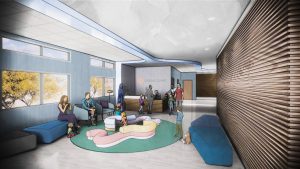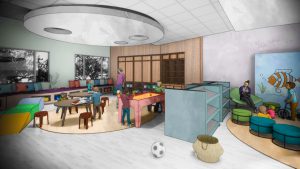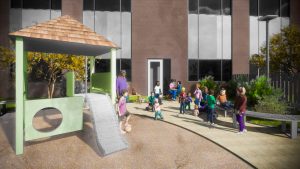Lorenz Announces Early Childhood Day Treatment
Lorenz Clinic has initiated a significant expansion plan at its Chaska location, where the clinic has been actively pursuing the development of added service lines including early childhood day-treatment and family-focused home-based services in addition to its existing outpatient psychotherapy and medication management offerings. Overall, the initiative will provide notably expanded access to early childhood mental health services in Carver County and outlying areas where such services for very young children have been conspicuously lacking. The program will open 3/1/20.
The new Day Treatment and its companion Home-Based program will feature high treatment fid elity and demonstrable clinical outcomes. Young children often require access to various levels of care, and these changes will offer families a more seamless experience of what for many has become an inaccessible and
elity and demonstrable clinical outcomes. Young children often require access to various levels of care, and these changes will offer families a more seamless experience of what for many has become an inaccessible and
all-too-fragmented system.
The expanded clinic will features four service lines:
- Outpatient Psychotherapy for all ages
- Early Childhood Day-Treatment
- Family-Focused Home-Based Services
- Medication Management
In order to add day-treatment and home-based services, the clinic has been preparing for Children’s Therapeutic Support Services (CTSS) certification with the State of Minnesota. The addition of CTSS certification will allow providers to serve families outside the four corners of the clinic and will enable them to provide a higher level of care that includes more than the typical one hour per week of therapy commonly found in outpatient settings.
About Day Treatment
 The day treatment program will be based on the treatment practice of Developmental Repair, an intensive treatment model that was developed by Dr. Anne Gearity to treat children who have experienced early complex trauma and are displaying aggressive and disruptive behaviors (Gearity, 2009). The treatment model will be used to treat children ages 3-7 in a day treatment program, three hours a day, five days a week. Through Developmental Repair, day treatment will target 4 main areas of functioning: relating, feeling, thinking, and acting. With a combination of group therapy and group skills training, children will move through a daily routine that includes art projects, snack, large motor play, structured learning activities (books, puzzles, and games), and school work. Each child will have individual goals created through collaboration among mental health professionals, clinical trainees, and/or mental health practitioners, and caregivers.
The day treatment program will be based on the treatment practice of Developmental Repair, an intensive treatment model that was developed by Dr. Anne Gearity to treat children who have experienced early complex trauma and are displaying aggressive and disruptive behaviors (Gearity, 2009). The treatment model will be used to treat children ages 3-7 in a day treatment program, three hours a day, five days a week. Through Developmental Repair, day treatment will target 4 main areas of functioning: relating, feeling, thinking, and acting. With a combination of group therapy and group skills training, children will move through a daily routine that includes art projects, snack, large motor play, structured learning activities (books, puzzles, and games), and school work. Each child will have individual goals created through collaboration among mental health professionals, clinical trainees, and/or mental health practitioners, and caregivers.
 Each day treatment room will be comprised of up to 6 children and 2-3 trained staff. The day treatment team will have day treatment specific consultation at least one time per week for 1.5 hours. Consultation will be provided by a mental health professional trained in Developmental Repair.
Each day treatment room will be comprised of up to 6 children and 2-3 trained staff. The day treatment team will have day treatment specific consultation at least one time per week for 1.5 hours. Consultation will be provided by a mental health professional trained in Developmental Repair.
Children participating in day treatment will attend either the morning session (9am-12pm) or the afternoon session (1pm-4pm). A premier goal of Developmental Repair is to support continued inclusion in the community and prevent social isolation due to challenging behaviors (Gearity, 2009). Collaboration between day treatment staff, caregivers, and educators will work to support attendance in both preschool and day treatment for the younger children, and day treatment and kindergarten for the older children. Ongoing collaboration between day treatment staff and educators will also support use of common language and goals.
Mental Health Professionals and Practitioners working in day treatment will work to build a partnership with families of clients in day treatment. Clinicians will encourage weekly family therapy that will include sessions with caregiver and child, and/or caregiver without child. Family therapy will happen in-center or in-home based on medical necessity. The Developmental Repair model will be utilized in family therapy and work to partner with caregivers to improve the child’s functioning in the community.
For More Information
For more information about the program, interested parties should contact Anne Fleming, the Assistant Clinical Director in charge of the program’s implementation and overall direction, at (952) 443-4600.
References
Gearity, A.G. (2009). Retrieved from http://www.washburn.org/pdf/WCCDevRepairGrayscale-singlepages-smallerfile.pdf, on 11/14/19.